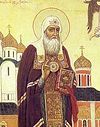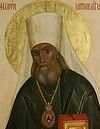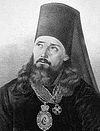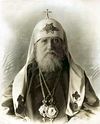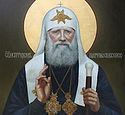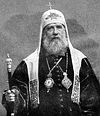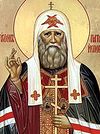

| Previous day | Next day |
| Old Style
October 5
|
Wednesday |
New Style
October 18
|
|
20th Week after Pentecost.
Tone 2.
Fast Day. |
Wine and oil allowed.
|
![]() Martyr Charitina of Amisus (304).
Martyr Charitina of Amisus (304). ![]() Sts. Peter (1326), Alexis (1378), Jonah (1461), Macarius (1563), Philip (1569), Job (1607), Hermogenes (1612), Philaret (1867), Innocent (Veniaminov) (1879), Tikhon (1925), Macarius (Nevsky) (1926), and Peter (Polyansky) (1937), hierarchs of Moscow.
Sts. Peter (1326), Alexis (1378), Jonah (1461), Macarius (1563), Philip (1569), Job (1607), Hermogenes (1612), Philaret (1867), Innocent (Veniaminov) (1879), Tikhon (1925), Macarius (Nevsky) (1926), and Peter (Polyansky) (1937), hierarchs of Moscow.
Hieromartyrs Dionysius, bishop of Alexandria, and the deacons Gaius and Faustus (264-265). Martyr Mamelta (Mamelchtha) of Persia (ca. 344). St. Gregory (Grigol), archimandrite, of Khandzta in the Klarjeti desert, Georgia (861). St. Damian the Healer, priest (1071), and Sts. Jeremiah (ca. 1070) and Matthew (ca. 1085), clairvoyants, of the Kiev Caves. St. Charitina, princess of Lithuania (1281). St. Varlaam, desert-dweller, of Chikoysk (1846). St. Seraphim (Amelin), schema-archimandrite, of Glinsk Hermitage (1958). Uncovering of the relics of New Hiero-confessor Basil (Preobrazhensky), bishop of Kineshma (1985).
New Hiero-confessor Gabriel (Igoshkin), archimandrite, of Melekess (Saratov) (1959).
Synaxis of the holy fellow-strugglers of St. Gregory of Khandzta (9th c.). St. Cosmas, abbot, in Bithynia (10th c.). St. John (Mavropos), metropolitan of Euchaita (1100). St. Matthew, founder of St. Nicholas-Cherneyev Monastery (Mordovia) (after 1573). St. Methodia, recluse, of Cimola (1908). Uncovering of the relics of St.Eudocimus the Unknown, monk of Vatopedi, Mt. Athos (1841).
Repose of Nun Agnia (Countess Anna Orlova-Chesmenskaya) of Novgorod (1848) and Hieroschemamonk Paisius (Olaru) of Sihastria, Romania (1990).
Thoughts for Each Day of the Year
According to the Daily Church Readings from the Word of God
By St. Theophan the Recluse

Wednesday. [Phil. 2:24-30; Luke 6:46-7:1]
And why call ye me, Lord, Lord, and do not the things which I say? Why do they call Him Lord, but do not do the Lord’s will; that is, why do they not acknowledge His lordship in their deeds? Because they only call with their tongue, and not with their heart. If their heart were to utter: “Lord, Thou art my Lord,” then complete readiness would abide in it to submit to the one whom they confess as their Lord. But since they do not have this, their deeds do not match their tongue; whereas deeds always match the heart. All right, so there is no point in calling: “Lord, Lord”? No, not so. But it is necessary to make the external word match the inner word, which is the feeling and disposition of the heart. Sit and reflect upon the Lord and yourself: what is the Lord and what are you? Think about what the Lord has done and still does for you, why you live and how it will end. You immediately will come to the conviction that there is no other way than to steadfastly fulfil the Lord’s entire will; there is no other path for us. This conviction gives birth to a readiness to fulfil in deed what is expressed by the word “Lord.” With such readiness a need for help from above will be awakened, and from it the prayer: “Lord, Lord! Help me and give me strength to walk in Thy will.” And this call will be pleasing to the Lord.
Articles
 Martyr Charitina of AmisusThe Martyr Charitina of Rome was orphaned in childhood and raised like a daughter by the pious Christian Claudius. |
 St Jonah the Metropolitan of MoscowSaint Jonah, Metropolitan of Moscow and Wonderworker of All Russia, was born in the city of Galich into a pious Christian family. |
 Icon of St. Innocent of Moscow weeping myrrh In KhabarovskThe unusual phenomenon was noticed by the seminary aspirants who came to take entrance examinations. |
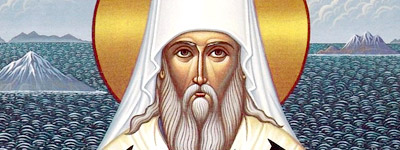 St. Innocent of Alaska and Moscow |
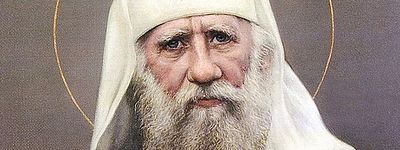 Patriarch Tikhon |
 Hieromartyr Dionysius the Bishop of AlexandriaSaint Dionysius, Bishop of Alexandria, was the son of wealthy pagan parents. He converted to Christianity at a mature age, and became a pupil of Origen. |
 Martyr Memelchtha of PersiaThe Martyr Memelchtha of Persia was, before her conversion to the Christian Faith, a pagan priestess of the goddess Artemis. |
 St. Gregory of Chandzoe in GeorgiaOur Holy Father Gregory of Khandzta was raised in the court of the Kartlian ruler Nerse. |








